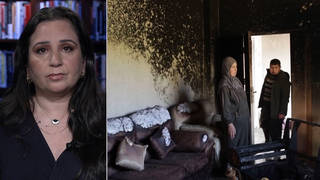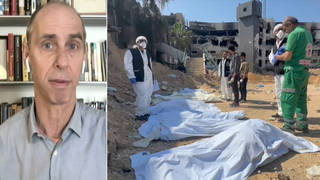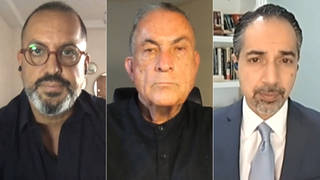
Related
Guests
- Clovis Maksouddirector of the Center of the Global South at American University and former ambassador for the Arab League to the U.N. and U.S.
- Phyllis Bennissenior fellow at the Institute for Policy Studies. She just returned from three weeks in the West Bank.
Israeli Prime Minister Ehud Barak and Palestinian President Yasser Arafat begin a peace summit with President Clinton at Camp David today.
Just an hour before departing for the talks, Barak faced down an unruly Parliament, barely surviving a vote of no-confidence.
The opposition Likud party failed to muster the 61 votes that would have ousted Barak. Fifty-four members voted for the motion of no confidence; 52 opposed it and seven members abstained.
Nonetheless, many observers are saying that Barak arrives today in Washington alone.
Three right-wing and religious parties, including Barak’s largest coalition partner, announced they were quitting the government, drastically reducing Barak’s support in Parliament from a sound majority to a minority.
Several key ministers in Barak’s Cabinet handed in letters of resignation. Foreign Minister David Levy announced he would boycott the U.S.-hosted talks.
Analysts and newspapers in Israel said the defections were triggered by Barak’s failure to build a consensus before the summit, and by a perception in the conservative wing of the coalition that he would turn over too much West Bank land to the Palestinians at the bargaining table.
Transcript
AMY GOODMAN: We move on now to our last segment. Israeli Prime Minister Ehud Barak and Palestinian President Yasser Arafat began a Middle East summit with President Bill Clinton at Camp David today. Before leaving for the United States, Barak faced down an unruly Parliament, surviving a vote of no-confidence, just hours before leaving for the talks. The opposition Likud Party failed to muster the 61 votes that would have ousted Barak. Fifty-four members voted for the motion of no-confidence.
Nonetheless, many observers are saying Barak arrives today in Washington alone. Three right-wing and religious parties, including Barak’s largest coalition partner, announced they’re quitting the government, drastically reducing Barak’s support in Parliament from a sound majority to a minority. Several key ministers in his Cabinet handed in letters of resignation. Foreign Minister David Levy announced he’ll boycott the U.S.-hosted talks.
Analysts and newspapers in Israel said the defections were triggered by Barak’s failure to build a consensus before the summit and by a perception in the conservative wing of the coalition that he would turn over too much West Bank land to the Palestinians at the bargaining table.
We’re joined now by Phyllis Bennis, senior fellow at the Institute for Policy Studies who has just returned from three weeks in the West Bank, and Ambassador Clovis Maksoud, director of the Center of the Global South at American University, former ambassador for the Arab League to the United Nations and the United States.
Ambassador Clovis Maksoud, what is Yasser Arafat looking for at this Camp David Middle East summit?
CLOVIS MAKSOUD: Well, I think he’s looking for some sort of being shielded out by the summit from the attempts by President Clinton to persuade him to do more concessions than he has done, to sort of deviate from the consensus that has emerged by the Palestinian National Council’s meeting last week, in order to extract more concessions as if to protect what the president is going to try and tell him, that this is the—ultimately, the peacemaker. And I think Mr. Barak is going to say that under the circumstances of the dismantling of his coalition, that he can no longer be in any further accommodating mood and that his insistence on the five points, what is called the red zones, about refugees, about Jerusalem, about settlements, about the borders, are not to be touched. And I think that that is a prescription, if not for a breakdown, at least for a momentary deadlock.
And I think President Clinton is going to try to maybe not achieve the breakthrough that he was hoping for, but at least to say that there would be a continuation of a peace process, but that some agreement on the framework of—guidelines of the ultimate solution should be spelled out in this summit meeting. But I don’t think that the framework—”framework” is always a loose term, terminology, which gives Israel the pretext to interpret it the way it wants. And I think that the Palestinian consensus at this moment is not in any disposition to accommodate Mr. Barak, who is going to shield himself from further attack by the right wing by adopting a right-wing agenda.
AMY GOODMAN: Phyllis Bennis, you’ve just returned from the West Bank. What do people there want and expect from this summit?
PHYLLIS BENNIS: Well, you know, Amy, I think the irony of the summit beginning right now is that Barak comes here having lost a great deal of official support, but with a recognized widespread mandate of popular support. Yasser Arafat comes with the support of some of his officials, who will be coming here with him, but having lost a great deal of public confidence and public support.
What people on the West Bank are very concerned about is that the official position that’s asserted over and over again by Arafat and other representatives of the Palestine Authority will not in fact be their bargaining position. The Authority is maintaining, on the public level, that they are committed to a return of all of the West Bank and Gaza, East Jerusalem as the Palestinian capital, the dismantling of all settlements, and, crucially, the right of return of all the refugees. That’s generally understood to be—to represent the Palestinian consensus. And, in fact, it represents a major set of concessions already, given that the West Bank and Gaza together only constitute 22 percent of historic Palestine.
But what everyone that I spoke to, particularly in the refugee camps, where fears are rising about being abandoned, being left behind by the negotiators—what people are afraid of is that those claimed positions will fall away very rapidly and that an agreement will be made for less than all of the West Bank, for a capital in Abu Dis, which is a town outside of Jerusalem. It’s an astonishing thing that that’s being touted in the press as a great concession on the Israeli part and a great acceptance on the Palestinian part, that they would expand—the Israelis would expand their official borders of Jerusalem to include a couple of small towns outside of Jerusalem, but nearby, and then announce that one of those towns could become the Palestinian capital and could be named Al-Quds, and the naming would be the concession. It’s as if saying that San Francisco’s borders would be expanded to include the little town across the Bay of Emeryville, and then you could declare Emeryville to be San Francisco, when the whole world knows that Emeryville is not San Francisco. Palestinians all know that Abu Dis is not Jerusalem. They want a capital in Jerusalem. They want a dismantling of the settlements.
And they want land which is not only a question of percentages, but that is contiguous and viable. You could have, for instance, 85 or even 90 percent of the land of the West Bank returned to the Palestinian Authority, but if that 5 percent is what it is today, in the form largely of bypass roads, access roads, bridges, tunnels and other means of dividing up that Palestinian land, you don’t have a viable state. What you have are cantons. What you have are truncated Bantustans surrounded by Israeli troops. So the numbers that get thrown out, in many ways, are a diversion from the reality of what people are looking for.
I’m afraid that the kinds of concessions that the Palestinian Authority will make under enormous pressure from the Clinton administration will be far more than what could be accepted by the Palestinian population. And what we’re likely to be left with is some version of a permanent interim solution, so that President Clinton will get his photo op that he so desperately wants for his legacy, the Palestinians will get a promise that, some future time, there will be another chance to renegotiate, and the Israelis will get some level of a sign-off for what they want, which is a declared end to the conflict.
AMY GOODMAN: And what about the announcement of an independent state that is expected to come by September 14th, Ambassador Maksoud?
CLOVIS MAKSOUD: Well, the paradox of it is that there has been a Palestinian state declared in 1988 and recognized by a significant number of countries it was a state under occupation, which is a legal definition of what the West Bank and Gaza and East Jerusalem are. And that is why they now—the Palestinian Council is insisting on implementing Security Council Resolution 242. The unfortunate part is that the Oslo Agreement has more or less marginalized this legal equation that existed and could have been a subject of negotiations between Israel and the Palestinians. However, what happened is that the Oslo Agreement sort of sidestepped this legal base of an occupied territory, because Israel does not acknowledge that it is, in the West Bank, Gaza and East Jerusalem, an occupying power, and therefore not accountable to the Fourth Geneva Convention. And that is why it keeps on proliferating and beefing up settlements, annexing more territories in Jerusalem and others, on the basis that there is no legal status and that, at best, the two—the Palestinians and the Israelis—have sort of equal legal claims into that territory. And that is the basic flaw that has delayed the negotiations from having any credible and lasting outcome. And then, therefore, the declaration of the Palestinian state over the entirety of the West Bank and Gaza, and East Jerusalem as the capital, is the minimum that the Palestinians would be able to develop a consensus that would make the peace durable.
AMY GOODMAN: Let me ask Phyllis Bennis, as we wrap up, but do you think that Yasser Arafat could return to another intifada, an intifada both against Israel and against the PLO leadership?
PHYLLIS BENNIS: Unfortunately, I don’t think that’s something that can be wiped out of the realm of possibilities. I don’t think that it’s certain that he will sign the kind of concessions that people on the ground are so afraid of. The key issue—and I think what it’s important for people to be watching—is what happens to the refugees. It’s not only what The New York Times this morning called the “mantra” of the Palestinian leadership to call for the right of return for all the refugees of 1948, as well as 1967. It’s also the basis of international law, U.N. Resolution 194, that has been signed off on every year since that time until 1994 by the United States. That has since been dropped out of the equation. But until there is an acceptance of the right of return, not simply a humanitarian willingness on Israel’s part to accept a few tens of thousands of Palestinians to return home, but acknowledgment of the right that remains in international law, I don’t think we
re going to have what Clovis Maksoud just spoke of as a durable peace.
AMY GOODMAN: I want to thank you both for being with us. Ambassador Clovis Maksoud heads the Center for the Global South at American University, formerly the ambassador for the Arab League to the U.N. and to the United States. Phyllis Bennis of the Institute for Policy Studies.












Media Options